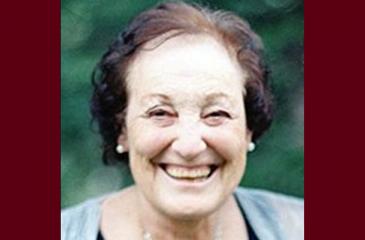“Here is an experience to which thousands of professionals across gerontology, geriatrics, and social work can relate,” said Dr. James Pacala, professor and head of family medicine and community health in the Medical School.
“A meeting begins. After a few minutes of rather sedate discussion, Rosalie blasts into the room, lugging a computer and a sheaf of papers, hair aswirl; she apologizes for being late (mentioning some calendar mishap), and sits down, smiling. Approximately 90 seconds later, she interrupts the speaker, and in a halting yet forced manner, as though her speech center can't quite catch up with her torrent of thoughts, she launches into discourse on the topic at hand, citing academic literature of the previous 20 years, drawing in the work of expert colleagues across the country and around the world, speculating about potential funding sources, and most of all, pointing out how far we need to go as a society to better serve its older citizens. This was Rosalie, and we loved her for it.”
Dr. Rosalie Kane was a social work scientist and gerontologist. She was a professor of social work and public health for more than 45 years and spent more than three decades at the University of Minnesota. She was an expert on aging and long term care. She was well-known nationally and internationally for her groundbreaking work and human-centered approach.
On May 5, 2020, Dr. Kane passed away in her home at the age of 79 with her daughters by her side. You can read her obituary and a feature on her life and work on MPR.
Dr. Kane had an openness about her that drew people in. Clear-eyed and with a wide grin, she had the ability to put others at ease, and in a long, illustrious career, genuine human connection lay at the heart of her life’s work. Her longtime colleague, Dr. Joseph Gaugler, recounted that in the last several years attending the Caring for People with Memory Loss conference together, her presence was not as the scholar or research pioneer she undoubtedly was, but instead that “She came to talk with families, to listen, and share stories.”
Dr. Kane’s passion and care went beyond academia; she truly enjoyed working with people and learning from them.
“Dr. Rosalie Kane was a tireless, creative scholar who consistently advocated for older persons with chronic health needs to continue to enjoy a ‘life worth living.’" said Dr. Gaugler, the Robert L. Kane Endowed Chair in Long-Term Care & Aging (named after Dr. Kane’s late husband, Dr. Robert Kane).
Her research and advocacy were central to the culture change movement in nursing and residential homes. She sought to change the narrative of caring for older people to one of preserving personhood and dignity. She helped seniors find joy in aging.
She served as co-investigator for the Minnesota Northstar Geriatrics Workforce Enhancement Program (Minnesota Northstar GWEP). Her focus was to prepare the geriatric workforce to maximize reasonable safety for long term care patients—including people living with Alzheimer’s disease and related dementias. Her latest research was on autonomy versus safety for older adults.
“I worked with Rosalie on GWEP. Rosalie was very energetic and committed to preserving the autonomy of older adults,” said Dr. Teresa McCarthy, a core member of the GWEP Interprofessional Geriatrics Coordinating Council. “Everyone knows ‘Rosalie’ and says so with a certain fondness reserved for well-honored and respected people in the field. She spoke often of her grandchildren. She shared a myriad of stories about [her husband] Bob and their adventures together as well as her father who lived to be over 100. She was eclectic, brilliant and driven to improve the lives of older adults. She and her work will not be forgotten by those in the field of aging.”
Dr. Kane had an extensive record of leadership in research, policy analysis, technical assistance on aging, disability, and on social work and psychosocial well-being in health settings.
"As a gerontologist and social work scientist, Rosalie was a pioneer in researching quality of life in long-term care settings,” said Dr. John Finnegan, Dean of the School of Public Health. “A prolific researcher, Professor Kane was nationally known for her creative and foundational work. She authored or coauthored more than a dozen books and hundreds of journal articles and chapters, and she is past editor-in-chief of both Health and Social Work, and of The Gerontologist, and served on three Institute of Medicine committees. Rosalie directed the University of Minnesota National Long-Term Care Resource Center for 11 years. She received the University’s Distinguished Women Scholars Award in Social Sciences for 2007. In 2012, she was inducted into the American Academy of Social Work."
Her most recent work includes contributing to the Minnesota Northstar GWEP Interprofessional Geriatrics Coordinating Council to provide content expertise about long term support services and social work.
“One significant consolation we can all have, in light of the loss of Rosalie Kane, is that the knowledge that she personally shared her passion for, and intellect about, older adults with a significant cadre of colleagues and students,” said Dr. Nina Tumosa, a public health analyst with Health Resources and Services Administration who worked with Dr. Kane. “The world becomes a better place every day that Rosalie’s legacy remains alive because each of us shares with others our stories and knowledge learned under the nurturing wing of Rosalie.”



